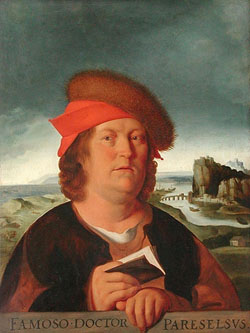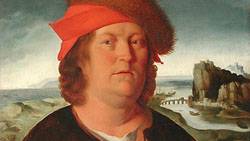Paracelsus and the Light of Nature
Source: naturasophia.com
 For twenty centuries, the humoral medicine of Greek and Arabic physicians dominated medical practice in the Western world. The body was thought to consist of four "humors" which mixed together in the correct proportion to create health. This meant that diseases were not looked upon as specific entities, but as imbalances between the humors. Medicinal agents were not conceived of as possessing specific capacities or affinities, but only the ability to change the relationship between humors: by purging, vomiting, sweating, salivating, etc. This was a medicine that lacked the notion of specificity in bodily processes, functions, medicines, biological laws, and diseases.
For twenty centuries, the humoral medicine of Greek and Arabic physicians dominated medical practice in the Western world. The body was thought to consist of four "humors" which mixed together in the correct proportion to create health. This meant that diseases were not looked upon as specific entities, but as imbalances between the humors. Medicinal agents were not conceived of as possessing specific capacities or affinities, but only the ability to change the relationship between humors: by purging, vomiting, sweating, salivating, etc. This was a medicine that lacked the notion of specificity in bodily processes, functions, medicines, biological laws, and diseases.A tendency towards specific medical knowledge was developing slowly, however. Empirical doctors and folk practitioners often found herbs that worked in an exact, reliable way for a certain problem. Primitive metallurgists and alchemists were slowly accumulating knowledge about the specific properties of substances. This movement was gathering momentum over the centuries. Eventually it would replace humoralism with a more or less "chemical" concept of how the body functions and is healed. Distinct organs, diseases, and medicinal agents would be recognized.
When the momentum had developed long enough in this direction, it was inevitable that an advocate for these new ideas should appear. This person was a Swiss-born physician, Theophrastus Bombastus von Hohenheim (1493-1541), popularly known as Paracelsus. He was the first person to advocate an essentially "chemical" view of the world. He saw the living organism as a complex of different substances, each of which could be understood and affected through specific medicinal powers. He developed the technical capacity to manipulate substances through a simple system of chemistry, so that he could create chemical remedies suited to chemical problems in the organism. Paracelsus anticipated the basic disciplines that constitute modern medicine---pharmacy, physiology, biochemistry and drug-therapy. He was also one of the first modern surgeons. In his practice we recognize the rudimentary elements of our modern system of medicine.
There is, however, an important difference between the medicine of Paracelsus and modern science. His approach united the spiritual to the material, the divine to the natural, the whole to the part. For him, the purely reductionist and materialist view of the modern era would have been unthinkable. His chemical substances corresponded with spiritual values, his principles to eternal laws. His medicine encompassed the life force, the wisdom of nature, and the spiritual faculties of human nature. Because of this orientation, the medicine of Paracelsus anticipated much that would later appear in alternative, as well as conventional, medicine.
Paracelsus was a revolutionary who had to jerry-rig terms and concepts in order to express ideas which were essentially alien to his own generation. This, coupled with his lack of social skills, caused his work to be largely unappreciated outside a small group of followers who circulated his manuscripts in private. These loyal students, as well as his phenomenal reputation as a healer and alchemist, stimulated interest in the Paracelsian corpus after his death, so that his collected works were published within a generation. They fertilized Western science and medicine from about 1565 to about 1665, giving rise to many new ideas. After that date his name was increasingly stigmatized and dropped from the agenda of dominant, mainstream thought. The importance of his contributions were forgotten. Only a few iconoclasts remembered him.
Because the system of Paracelsus is founded on universal and spiritual principles, poured forth in a voluminous rush of fresh, newly invented, stimulating words and grammar, his writings have a numinous quality, pregnant with spiritual implications. He has inspired savants down through the centuries. Power and beauty hover in the work of Paracelsus, inspiring us to look beyond the limitations of the materialist worldview. This quality is not appreciated by the advocates of conventional science, but it provides a valuable foundation for a medicine which is natural, spiritual, vitalist, and holistic in composition.
[...]
Read the full article at: naturasophia.com






















